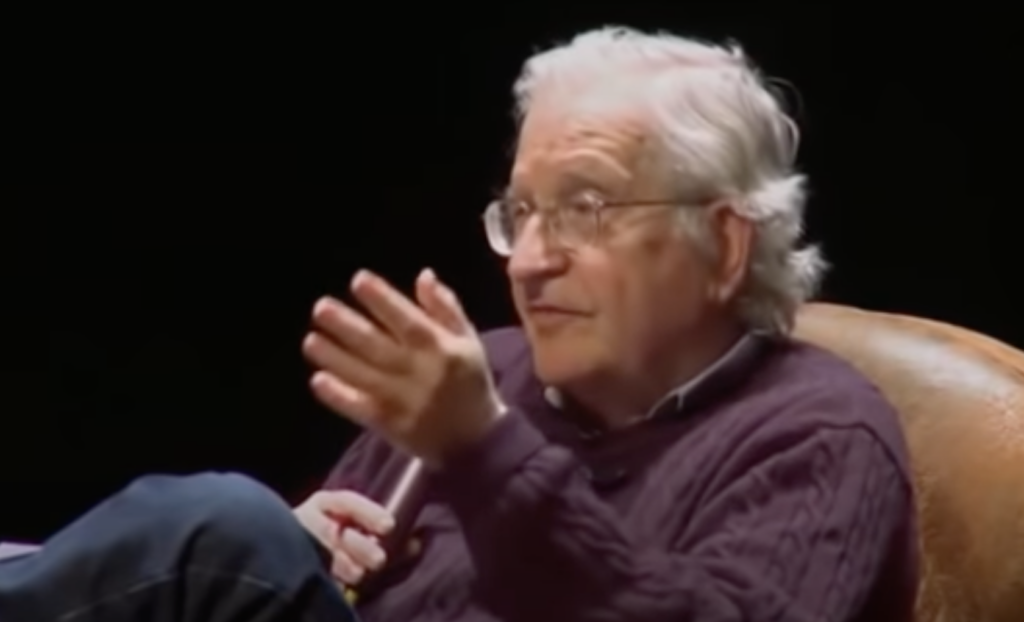Noam Chomsky made his title as a linguist, which is straightforward to neglect amid the big selection of topics he has addressed, and continues to handle, in his lengthy profession as a public mental. However on a deeper stage, his commentary on politics, society, media, and a number of different broad fields sounds not in contrast to a pure outgrowth of his specialised linguistic theories. All through the previous 5 or 6 many years, he’s often made the connection express, or almost so, by drawing analogies between language and different domains of human exercise. Take the panel-discussion clip above, through which Chomsky faces the query of why he doesn’t settle for the notion of cultural relativism, which holds ethical norms as not absolute however created wholly inside explicit cultural contexts.
“There aren’t any skeptics,” Chomsky says. “You’ll be able to focus on it in a philosophy seminar, however no human being can, actually, be a skeptic. They wouldn’t survive for 2 minutes in the event that they had been. I believe just about the identical is true of ethical relativism. There aren’t any ethical relativists: there are individuals who profess it, you’ll be able to focus on it abstractly, but it surely doesn’t exist in strange life.” He identifies “an inclination to maneuver from the uncontroversial idea of ethical relativism” — that, say, sure cultures at sure instances maintain sure ethical values, and different cultures at different instances maintain different ones — “to an idea that’s, actually, incoherent, and that’s to say that ethical values can vary indefinitely,” tethered to no goal foundation.
If morality is transmitted by tradition, “how does an individual purchase his or her tradition? You don’t get it by taking a capsule. You purchase your tradition by observing a fairly restricted variety of behaviors and actions, and from these, establishing, in some way, in your thoughts, the set of attitudes and beliefs that constitutes tradition.” He attracts a pure comparability between this course of and that of language acquisition, which additionally is determined by “having a wealthy built-in array of constraints that permit the leap from scattered information to no matter it’s that you simply purchase. That’s nearly logic.” And so, “even should you’re probably the most excessive cultural relativist, you might be presupposing common ethical values. These could be found.” When he spoke of “probably the most excessive cultural relativist,” he was pondering of Michel Foucault?
Again in 1971, Chomsky engaged the French thinker of energy in a debate, broadcast on Dutch tv, about human nature and the origin of morality. There he virtually lead with linguistics: a toddler studying to speak begins “with the data that he’s listening to a human language of a really slim and express kind that allows a really small vary of variation.” This “extremely organized and really restrictive schematism” permits him to “make the large leap from scattered and degenerate information to extremely organized data.” This mechanism “is one basic constituent of human nature,” in not simply language however “different domains of human intelligence and different domains of human cognition and even habits” as properly. Maybe we do have the liberty to talk, suppose, and act nevertheless we want — however that very freedom, if Chomsky is appropriate, emerges solely inside strict, absolute, wholly un-relative pure boundaries.
Associated content material:
Michel Foucault and Noam Chomsky Debate Human Nature & Energy on Dutch TV (1971)
An Animated Introduction to Michel Foucault, “Thinker of Energy”
Michel Foucault Gives a Clear, Compelling Introduction to His Philosophical Mission (1966)
Moralities of On a regular basis Life: A Free On-line Course from Yale College
Primarily based in Seoul, Colin Marshall writes and broadcasts on cities, language, and tradition. His initiatives embody the Substack e-newsletter Books on Cities, the e book The Stateless Metropolis: a Stroll by Twenty first-Century Los Angeles and the video collection The Metropolis in Cinema. Observe him on Twitter at @colinmarshall or on Fb.


